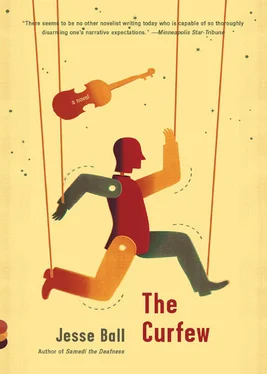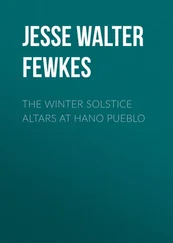This is an auditorium without seats. There is a stage and fine carpeting, a place for seats, but no seats. There is tiering, and avenues up to doors, footlights. There is a figure at the window. She shouldn’t be here.
CURTAIN
Several scenes then in which Louisa and William become acquainted with each other. She is the daughter of a prominent politician. He is a musical prodigy from humble origins. He is gentle and dark and unrelenting. She is witty and playful. Her speech is littered with references to philosophical figures and instead of arguing a point she will sometimes choose to point out that so-and-so has already shown that concept to be fallacious. She is an expert horticulturist, a hobby of her mother’s that she took on as a child. She, however, has never mentioned this to William. He is desperately in love with her. They meet in odd places. They eat supper on the floor of the room he lives in. He sneaks into her house at night. They are daring and hopeful. They expect that they will soon be married.
Molly’s mouth is open slightly. Her posture is raised, expectant. The theater could not be so many things, and yet it is. The puppetry is beyond all expectation. Who could believe that the puppets are not alive, that their movements do not originate there in their wooden frames beneath their finely sewn garments, their fur, their feathers? One has always understood what a puppet looks like, what it can do. But this is not that. Is it possible, wonders Molly, for the finest things to be hidden? To be hidden and never shared?
There was a light rainfall and then it cleared. The threat of the storm was such that everyone decided to stay in all day. Only two people went out of their houses. William was one of them. Louisa was the other. They had decided to go out in the rain, but there was no rain to go out in.
A sort of one-room schoolhouse. Out of it comes William. He walks to the front of the stage and sits on a bench. He is looking down at Molly. He appears very much to be her father. Behind her, the puppets in the audience shift uneasily in their seats. Mrs. Gibbons coughs. The schoolhouse has gone and now there is the entrance to a ferryboat. Louisa disembarks. She says, to no one in particular,
— I was not on a boat. I wanted merely to avoid pursuit.
Her walk is extremely graceful and menacing. She has the aspect of a wolf.
Molly remembers this, although she remembers little else.
Louisa sits on the bench beside William. They look well together. Light clapping from the audience.
— My conductor believes I should practice the most difficult parts by the lions’ cage of the zoological enclosure.
— Have you tried it?
— Each time I become drastically better.
— Do you pay attention to their faces?
— The lions’ faces?
Louisa is carrying something. It is a package of some sort. William becomes aware of it. They speak regarding the package. He takes it in his hands and opens it. On the stage, the puppet actually manages to utilize his appendages in order to open a sealed package using a small knife. Inside the package is a hat. He puts it on.
— In the band of the hat, says Louisa, is written the place of our next meeting.
She kisses him. They go off in opposite directions.
And …
In the distance, a crowd is waiting, painted onto the scenery. It is composed of everyone they will ever meet. Not a single person in the crowd can see the others, and they stand quietly, weight drifting idly from one foot to the other.
CURTAIN
The floor of the theater is painted like the ceiling of the sky as seen from above. The veiled puppet appears onstage.
Molly sits up straight. She looks around. The puppets behind her are all intent on the stage. Mrs. Gibbons’s eyes do not stray either. A little light is at the edge of the shuttered window. Molly looks at her feet. She looks up at the stage again. The veiled jester is watching her.
— Molly, he says. The play must continue.
He gestures for the curtain to fall and it does. It opens again and the jester is gone. In his place is a grove of trees.
William and Louisa enter. It is somehow clear that Louisa is pregnant. They have been married and living together in a fine and upstanding fashion while William’s concert career blossoms. Meanwhile, Louisa meets various disreputable intellectuals for confusing theoretical conversations. Both are happy. They are carrying a trunk. William has a shovel. He digs a hole and they bury the trunk.
— Our child will one day learn of this and find this place and gain possession of many of the key treasures of our early life.
They throw the dirt over. Louisa’s skirt becomes filthy. She makes a joke about it, but William does not laugh. He is peering into the underbrush to be sure no one has seen the burial. He feels they are being watched.
CURTAIN
Someone is singing very quietly. Louisa is sitting by a cradle. The house is very much like an owl, or like the house of an owl. Through the window a soft light obscures her features. A door can be heard opening deeper in the house. Footsteps. The door to this room opens.
ENTER WILLIAM
— My dear, it took so long. I couldn’t get away. The others didn’t have their part exactly right, and you know how Werz is. He wouldn’t let them off the hook. So we all had to sit there.
He and Louisa look down into the cradle. The cradle is empty. Molly is traveling towards it, but has not yet arrived.
— Do you know, whispers William, that when I was a young man I would never stay the full length of anything? I would go to a show and leave partway through. I would slip out of dinner parties, evening parties, breakfasts. I’d slip out and just wander off down the street, extremely happy. It became a sort of joke among my friends, but they could do nothing to stop it. I’m sure I offended some people, but they were probably people I didn’t like in the first place.
The person is still singing, and begins to sing louder. It is impossible to say what the person is singing. William and Louisa can no longer be heard, although they are plainly speaking. Molly struggles to hear what they are saying, but she cannot. This part of her childhood is lost for a second time. She is on the edge of her seat.
The puppet show proceeds rapidly through the exposition. Molly cannot yet walk; she must be carried. Later, perhaps she can walk a bit. She and William and Louisa are often to be seen in the parks and on the long avenues. As they walk, the trees bend towards them, the grass stands up on long legs, the air convenes and disperses, making light breezes and zephyrs.
A man in a blue hat, Lawrence, comes to visit one day. The set is dark. It is the middle of the night. There is a knocking. A light comes on. Louisa gets out of bed. She walks down the set through various hallways and stairs, trailing the thinnest of marionette wires. At the bottom, the door and on it a fine brass knob. She touches it with her hand and makes as if to turn it.
— Who’s there?
— Louisa, it’s me. It’s beginning. You have to get out of here. I’m leaving myself. Tell William. The musicians will be among the first to go. I’m sure of it. And you, certainly you know they’ll never let you off.
She opens the door. The sight of a man in a blue hat confronts her. It is, in fact, Lawrence.
William joins them at the door.
— Lawrence, what are you talking about?
— News from out of town. They’ve set the congress on fire. The whole thing’s begun. The army is with them. The whole thing’s done. It’s useless.
Lawrence runs out into the street. In the distance, the sound of something hitting a tin can.
Mr. Gibbons’s face comes around the side of the house, impossibly large. He addresses the audience:
Читать дальше












